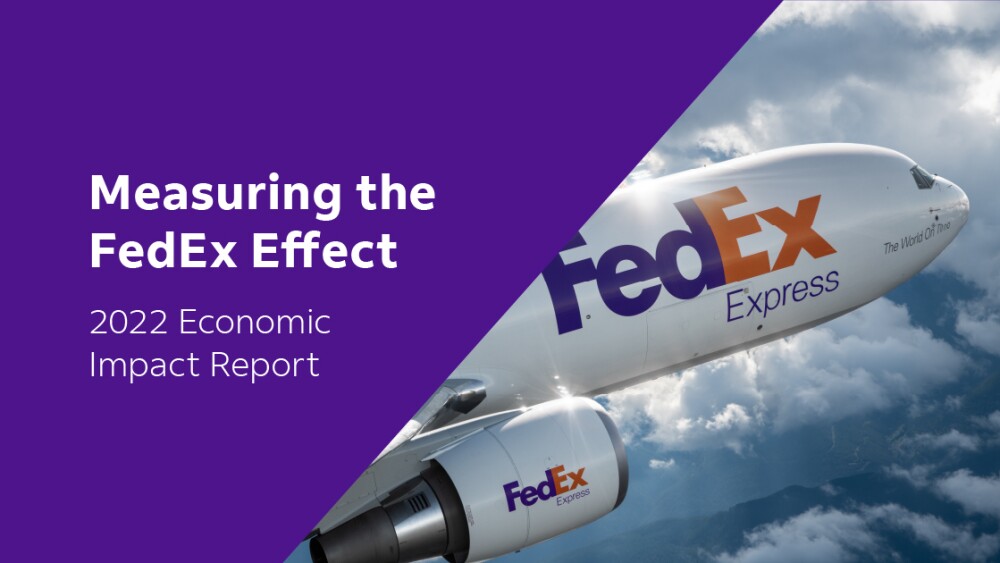Dubai, UAE, November 14, 2022 – FedEx Corp. (NYSE: FDX) released the findings from its 2022 report that analyzed the company’s impact on the global economy with key regional and market-specific analyses from around the world at the conclusion of its 2022 fiscal year (FY 2022). The report, produced in consultation with Dun & Bradstreet (NYSE: DNB), a leading global provider of business decision-making data and analytics, for the first time analyzed the impact FedEx has on economies around the world. Over the past 49 years, FedEx has expanded its services to more than 220 countries and territories and invested in a global network enabling businesses of all sizes to access and grow the global economy.
The report found that FedEx played an integral role in helping businesses recover from the pandemic while overcoming strained supply chains and economic challenges. With nearly 550,000 employees worldwide, FedEx moved an average of 16 million shipments each day through its 5,000 facilities in FY 2022. The company’s network optimization and investments improved efficiency and capacity for FedEx customers.
“All around the world, FedEx helped individuals, businesses, and communities emerge from the pandemic by moving goods and providing services that connect us and power the global economy,” said Raj Subramaniam, President and CEO, FedEx Corporation. “The report illustrates the ongoing and important work we do every day, including supporting small- and medium-sized businesses which are the backbone of our local communities. We call this, the ‘FedEx Effect.’”
The shipping and logistics company plays a role in fueling innovation, creating, and supporting local jobs, as well as helping lift individuals and their communities regionally and in major markets around the world. See the global results here.
Measuring the FedEx Effect Across Asia Pacific, Middle East and Africa (AMEA)
The company’s presence in Asia Pacific, the Middle East, Indian Subcontinent and Africa serves more than 100 countries and territories in a highly inter-connected region that is playing an increasingly prominent role as a driver of global trade. To support the region’s economic recovery from the COVID-19 pandemic, FedEx made strategic investments, as outlined in the report, that contributed to a 13% increase in employment, supporting more than 58,000 jobs beyond its 37,000 team members in the AMEA region.
FedEx economic footprint in the Middle East and North Africa continues to grow. The company recently established a direct commercial presence in Saudi Arabia, Egypt, and Jordan to meet the countries’ growing international shipping demands. In Saudi Arabia, FedEx has committed to invest more than US$400 million into the Saudi economy over 10 years through talent management and local operations and infrastructure, supporting the country’s non-oil economic growth.
“Through our continuous commitment to the region we have helped support hundreds of thousands of businesses and communities still recovering from the pandemic,” said Kawal Preet, regional president, Asia Pacific, Middle East, and Africa (AMEA), FedEx Express. “Our investments in our hubs in Guangzhou, Osaka and Dubai enable us to meet demand and optimize routes for our customers as supply chains fluctuate. Our new and improved facilities like the Clark gateway facility in the Philippines, as well as the consolidation at our Delhi hub creates greater access to emerging markets and increases efficiency.”
UAE Spotlight
FedEx began serving the United Arab Emirates (UAE) in 1989 and continues to invest in the market today. In FY 2022, FedEx spent $32 million with business in UAE that make up the company’s supply chain. The company also saw tremendous growth in shipping volume with exports to the U.S. rising 59% and exports to Asia Pacific rising more than 25% between FY 2021 and FY 2022.
In March 2022, FedEx broke ground on a new hub at Dubai South’s Logistics District. Located in proximity to Dubai World Central Airport, the new regional hub will incorporate state-of-the-art technologies and will be developed with sustainable operations and energy use in mind. The company is designing the new FedEx Express Dubai hub in accordance with the Dubai Municipality Green Standard for sustainable building and regulation. The hub will include solar panels that generate approximately one megawatt of power, 100% LED lighting, charging infrastructure for commercial delivery vehicles and employee passenger cars, and a building management system to automatically manage cooling and lighting.
Read the full FedEx Economic Impact Report and explore the FedEx Effect in communities and regions around the world.
